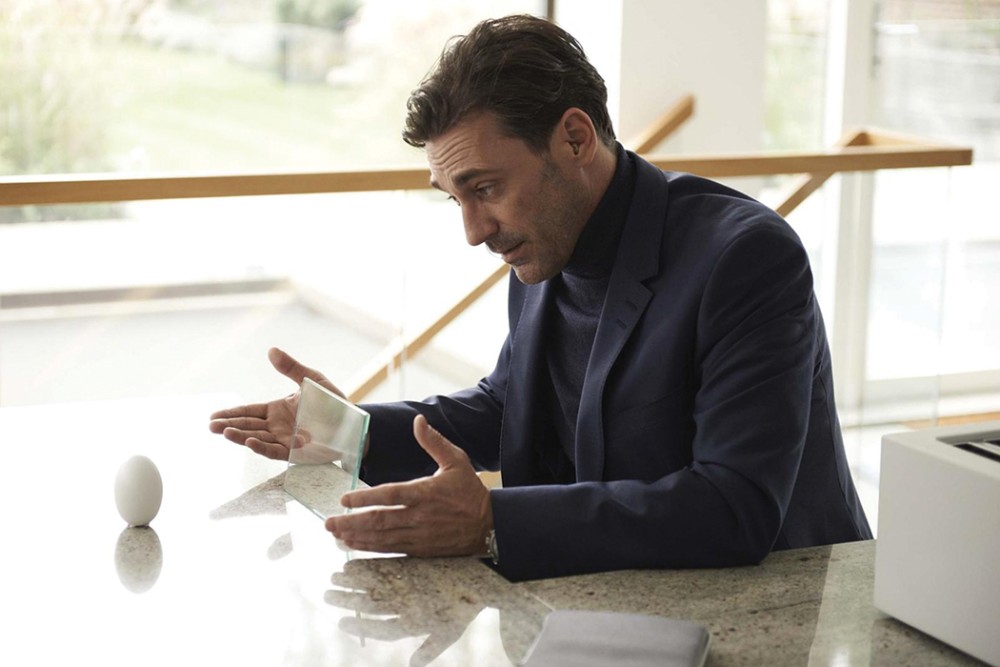Black Mirror shows us ourselves, being terrible and constantly getting better at it
The tech-focused series provides abundant fuel for ethical and theological debate.

In one of the earliest episodes of the television show Black Mirror, a man named Liam destroys his life through the use of a new technology. In this imagined near future, humans are able to implant tiny “grains” behind their ears that record everything the person sees and hears. The memories can be accessed with a remote control device that either replays the memories in the mind or projects them onto a screen to share with others. Discovering through this device the proof of his wife’s infidelity (preserved inside her memories), Liam is driven to distraction, replaying the scenes in his head. And when the marriage dissolves, he goes mad indulging in scenes of their happier moments.
Each episode of Black Mirror, streaming on Netflix, is a stand-alone story about some technological dystopia. The tone and settings of these episodes can vary from apocalyptic wasteland to family drama to murder mystery to an eerie fantasy version of our present moment—our recognizable lives, but seemingly better. Or perhaps, worse, because the characters can’t see how badly things are going.
Read our latest issue or browse back issues.
In many episodes, it’s only a small step to putting ourselves in the imagined future. The current season features an episode about a monitoring device implanted in a child’s brain so parents can see what the child sees—the ultimate accessory for helicopter parents. In others, the stretch to the future is much greater.
Even at their darkest, episodes of Black Mirror help us understand the desires that draw us to technological advances—the desire for control, or knowledge, or help with ordinary difficulties. A recurring theme is our entrapment by technology. Once we have adopted a particular technology, we do not seem to be able to do without it. The characters must live out the consequences.
For example, in the episode about Liam, “The Entire History of You,” there’s an early scene of Liam and his wife at a dinner party where, out of all the guests present, only one woman does not have a grain. The other diners suggest that she is not just foolish for this choice but contributing to social breakdown. Sure enough, the next day she witnesses a crime. Without a grain, she cannot capture what she sees for law enforcement, and the police have lost the skills to deal with eyewitnesses who rely on unaided recall.
In a bleak “Christmas special” between seasons two and three, two men are stranded in a wintry outpost swapping stories over Christmas dinner. We learn that one of them, Matt, used to work for a company that created digital home organization systems, like Amazon’s Alexa or Google Home. A small “cookie” can be embedded in the client’s brain for a week to capture the client’s consciousness—all her thoughts, desires, memories, and feelings. Once extracted, it is inserted into the management system, enabling it to run the client’s life exactly as the client would run it herself.
The problem, Matt relates, is that the extracted consciousness acts like a real person, who rebels against being trapped inside a machine. His job was to torture the consciousness until it submitted to the protocol. The consciousness is eternally trapped inside the cookie, a slave to the very same self she thinks she is.
Since Matt’s clients never interact directly with their own enslaved consciousnesses, they experience only the benefits of a perfectly organized life: a toaster that crisps their bread to exactly the right degree, an alarm clock that plays their favorite music, a cup of coffee brewed to perfection just as they step out of the shower. In this case, the client is not even aware of the moral price that makes her well-orchestrated life possible. Once the technology takes over, the characters cannot imagine their lives without it, and everyone is stuck in it together. The lure has become a trap.
Black Mirror provides constant fuel for ethical and theological debate. Are we prepared to rethink what it means to be human when our own inventions cry out for moral justice? What sense would we make of death or dying if we could extend our consciousness into an infinite virtual horizon? Is forgiveness possible in a world of instant replays?
For all its metaphysical speculating, Black Mirror excels in suggesting that technology does not make us unrecognizable monsters; it simply amplifies the monstrous impulses already in us. I don’t need a grain to know that all of us are plagued by memories that bring us joy or shame and that most of us would gawk at the roadside accident of our own minds if given the chance. Liam’s jealousy, obsession, and desire for control are ancient. When we turn off our phones and stare into the black mirror of our blank screens, we see what has always been there. Black Mirror gives us a chance to probe those depths before we forget what makes us human to begin with.
A version of this article appears in the print edition under the title “Our new and improved worst selves.”






